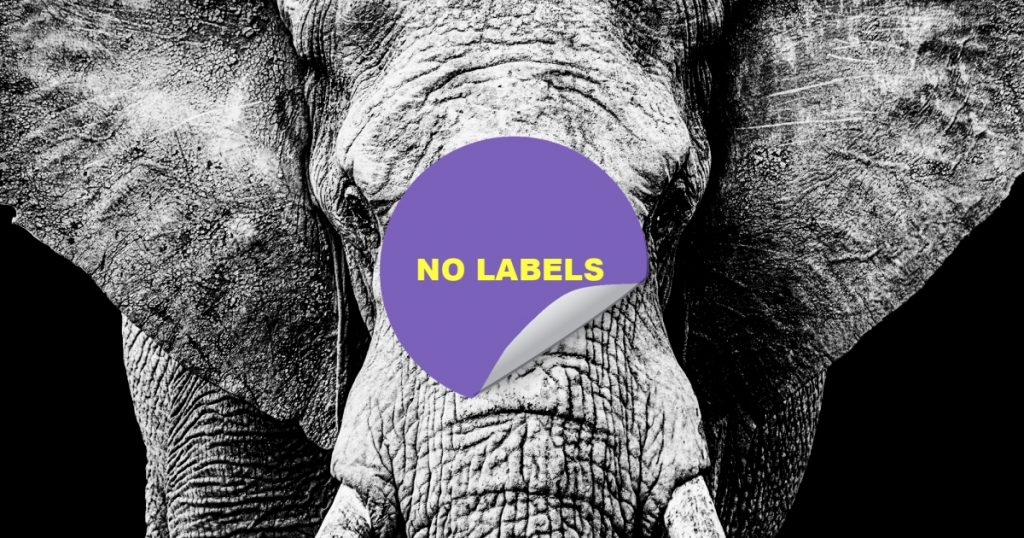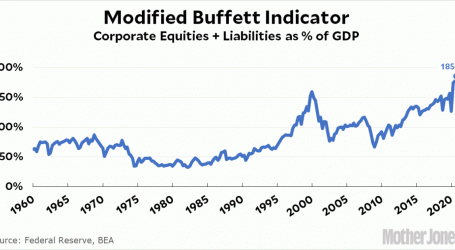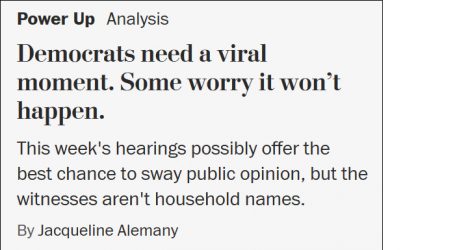No Labels Is Helping a Firm that Raises Money for Right-Wing Extremists
Mother Jones; Getty
Fight disinformation: Sign up for the free Mother Jones Daily newsletter and follow the news that matters.No Labels is a political outfit that hails political centrism, calls for bipartisanship, and is considering running an independent ticket in the 2024 presidential election that could end up spoiling President Joe Biden’s reelection bid. On its website, the group urges politicians and citizens to eschew the “extremists on the far left and right,” and it asks people who are “fed up with the angriest voices dominating our politics” to sign up as members and donate to the group. But No Labels neglects to inform its online contributors that a cut of their gift goes to a company that aids Republican candidates and far-right organizations that engage in the harsh politics of extremism that No Labels professes to renounce.
Donations to No Labels are handled by an online fundraising platform called Anedot. According to its website, Anedot typically charges political groups a 4 percent fee plus 30 cents per transaction. Under that formula, when an online contributor sends No Labels $100, Anedot pockets $4.30. That money bolsters Anedot’s mission to raise funds for the right and the GOP.
Anedot was founded in 2010 by Paul Dietzel, the grandson of a legendary Louisiana State University football coach. He ran unsuccessfully for Congress as a Republican in 2014. In 2019, he created a small-donor online platform called Give.GOP, just as the Republican Party was launching a rival site called WinRed. The National Republican Committee did not take kindly to Dietzel’s project and fired off a cease-and-desist letter to him, accusing Dietzel of using the committee’s trademark and logo without permission. The GOP’s opposition doomed this Dietzel venture.
But Anedot, according to Dietzel, thrived. In 2020, he told a conservative news site, “Anedot currently serves more than 1,500 Republican candidates and elected officials, and is the only privacy-focused payment processor built and owned by conservatives.” He added, “Anedot has more Republican customers than all other platforms combined—nearly all of whom support [Donald Trump].”
Anedot’s website boasts that it has processed billions of dollars in contributions since it started, and the groups it cites as key clients are conservative and religious organizations: Focus on the Family, the Susan B. Anthony List (a prominent foe of reproductive rights), the Thomas More Society (a conservative Catholic group that supported Trump’s election deniers), the Reformed Theological Seminary (which is “committed to the Bible as God’s inerrant Word”), and the International Alliance for Christian Education.
On Dietzel’s Twitter feed, he has supported James O’Keefe, the infamous right-wing provocateur who mounts sting operations against media and liberal figures, and he has amplified criticism of the supposed “woke mind virus.” In February Dietzel retweeted a tweet from a conservative activist named Seth Weathers who asserted, “I’m increasingly convinced the majority of problems are due to the lack of testosterone in men.”
Anedot describes itself as nonpartisan. But it has a distinct ideological bent and seeks to boost Republicans and conservative causes. In January, Dietzel announced Anedot Direct, a method for donors to contribute directly to campaigns and causes, bypassing middlemen. Anedot pledges that it does not share the data of these donors. (A contributor to a political campaign or ideological organization can end up on mailing lists and be endlessly solicited by other outfits.) Anedot charges what it calls a “small processing fee” for these donations.
On its Anedot Direct page, the firm promotes a “Conservative List” of organizations and candidates who can receive contributions directly through this service. The roster includes 205 entities, including 46 state GOP committees, Sen. Tim Scott’s and Nikki Haley’s presidential campaigns, 109 House Republican members (including Reps. Jim Jordan, Marjorie Taylor Greene, Lauren Boebert, and Matt Gaetz), 37 GOP senators (including Ted Cruz, Mitch McConnell, Tom Cotton, Marco Rubio, and Rand Paul), and 11 organizations (including Turning Point USA, Moms for America, the National Association for Gun Rights, and the National Republican Congressional Committee).
There is no listing of liberal and centrist groups on the Anedot Direct page. This service seems designed to boost GOP and archly conservative establishments, including organizations that promoted Trump’s lies about the 2020 election, such as Turning Point USA, which is headed by Charlie Kirk, a prominent proponent of the baseless charge that the election was stolen from Trump.
Anedot and Dietzel did not respond to multiple requests for comment.
For months, No Labels has been getting on the ballot in states across the country, in possible preparation to run what it calls a “unity ticket” in the 2024 presidential race. The most discussed potential candidate for No Labels has been West Virginia Democratic Sen. Joe Manchin, who has said nothing definitive about whether he would participate in this effort. Democratic strategists and activists eye this project with much suspicion. (The Maine secretary of state recently accused No Labels of possibly misleading voters in the state into signing a form that changed their party affiliation to No Labels—a charge the organization denied.) Last week, prominent Democratic strategists and Never-Trump Republicans met privately in Washington, DC, to discuss how best to counter a No Labels presidential campaign.
No Labels, whose co-founders include former Sen. Joe Lieberman, a Democrat turned independent, does not disclose its funders, but news stories have revealed that it has received large donations from right-wing billionaires, such as Harlan Crow (most infamous for being a Nazi-memorabilia-collecting benefactor of Supreme Court Justice Clarence Thomas). Its CEO, Nancy Jacobson, a former Democratic fundraiser, is married to Mark Penn, the former Clinton political adviser who distanced himself from the Democratic Party and who occasionally met with Trump in the White House. No Labels insists Penn is not involved with the group. But the organization has hired HarrisX to conduct polls, and Penn oversees that firm’s corporate parent.
No Labels did not respond to several inquiries. When a Mother Jones reporter called the organization, the woman who answered the phone said he would have to direct questions to Maryanne Martini, the communications deputy for No Labels. But she refused to provide Martini’s email address.
Critics of No Labels point to past donations from right-wing funders and the proximity of Penn to the group to raise questions about its agenda and spur speculation about its intentions. With No Labels a dark-money group, much key information about it remains unknown. Might its efforts end up hurting Biden and helping Trump? That’s not yet clear. But one thing is: Whenever a supporter heeds the outfit’s call for bipartisanship and moderation and clicks on its “donate” button, he or she is putting money in the pocket of a conservative tech firm that’s advancing far-right extremism.





